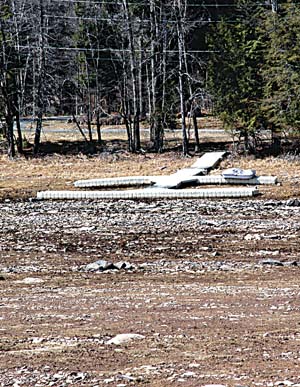
|
Dan Hust | Democrat
Docks lie on dry land along the former shoreline of Toronto Reservoir, though the water level is slowly rising.
|
Toronto runs dry, patience runs thin
By Dan Hust
WHITE LAKE — Those who’ve ever lost a lure in the Toronto Reservoir now have a good chance of finding it on the exposed lakebed.
But those who’ve lost the water access, property values and enjoyment of what was once one of Sullivan County’s largest bodies of water don’t know when – or if – they’ll get any of that back.
“We’re paying a lot of taxes, and it’s based on the fact that we have waterfront property,” resident Carole Abramson told the Bethel Town Board last week. “We have no waterfront!”
But according to Alliance Energy, which owns and operates the reservoir, there is no such thing as waterfront property along Toronto.
“None of the recent property developments in the area of the Toronto Reservoir contain lakefront property,” Alliance’s vice president of operations and new development, Joseph Klimaszewski Jr., wrote to Bethel Supervisor Dan Sturm on February 10.
Klimaszewski explained that a 50-foot buffer around the lake is owned by Alliance but open to the public. And he pointed out that Toronto’s existence is primarily to provide hydroelectric generation.
“The Toronto Reservoir is not a lake and cannot be operated to maintain lakefront living expectations,” he wrote.
He told the Democrat yesterday that the reservoir is refilling (confirmed by local residents) and, if normal weather patterns hold, may be back to the “normal” level of 1,220 feet above sea level by the end of spring.
For now, however, docks lie like beached whales along the reservoir’s former shoreline. A sparkling but small stream riffles past a gigantic boulder once hidden underneath three feet of water. The Moscoe Road boat access now serves as an entrance ramp for trucks and ATVs illegally skittering across the muddy flats.
The reservoir is a greatly shrunken version of its former 860-acre self, with a water level around 1,190 feet above sea level.
Residents say that’s up from a low of 1,175 feet earlier this winter, but if vegetation gets a chance to grab hold amidst the acres of dirt, the area will once again look like it did before the Toronto Creek was dammed in 1927.
And that’s not sitting well in a township recently focused on growth in harmony with nature – and greatly dependent on the enormous tax revenues generated by the high-end Chapin Estate residential development that occupies two-thirds of the now-dry shoreline.
“You’re going to have a lot of grievances,” Abramson warned town board members on Thursday, where she pushed for the kind of temporarily reduced assessments other property owners got when the nearby Swinging Bridge Reservoir was drained to repair a compromised dam.
She didn’t get an answer on that, but she did get promises from town and county officials.
“We understand the financial implications to the town and county,” County Legislator David Sager told her, remarking that he’s been speaking about it with his fellow county government leaders. “We are trying to set up further meetings.”
“This board is doing whatever we can possibly do to twist this energy company’s arm,” added town board member Dick Crumley. “... They’re causing us a lot of problems, and they could cost us a lot of money.”
Two years ago, Alliance, with gas and electric interests upstate, moved into the area and bought the Toronto Reservoir, the Swinging Bridge Reservoir and three other downstream reservoirs along the Mongaup River.
And according to the Federal Energy Regulatory Commission (FERC, which regulates hydroelectric reservoirs), they can do exactly what they’re doing.
“There are no lake level requirements for the Toronto Reservoir,” FERC spokesperson Celeste Miller said yesterday. “They are in compliance with their FERC permit.”
Meanwhile, Assemblywoman Aileen Gunther said she’s working with the state Department of Environmental Conservation (DEC) on a solution, while Senator John Bonacic recently fired off an angry letter to Alliance.
Bethel Supervisor Dan Sturm added to the criticism at Thursday’s board meeting.
“I don’t think, in my opinion, that we’re dealing with an honest, reliable, upfront partner,” he remarked. “And I do mean Alliance Energy.”
Iroquois Hunting and Fishing Club President Steve Sudol is not interested in getting into a fight with Alliance, but his 60-member club – which has private deeded rights to about half of Toronto’s waters – has abandoned more than a decade’s worth of efforts to stock Toronto with walleye, brown trout and rainbow trout.
“We discontinued that this year,” said Sudol, because the water level – “pretty consistent” since 1998, he said – has fallen far enough to damage the fishery, in the club’s view.
Yet DEC spokesperson Wendy Rosenbach said yesterday, “We haven’t seen any negative impacts to wildlife.”
While the DEC is supportive of a mutually agreeable resolution that supports a “viable, warm water fishery,” Rosenbach said her agency’s oversight “is fairly limited” compared to FERC’s.
Coming Friday: an in-depth look at the players in the reservoir’s future, and the arguments for and against current operations.



